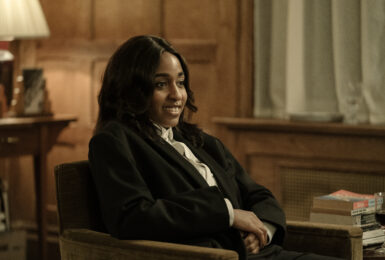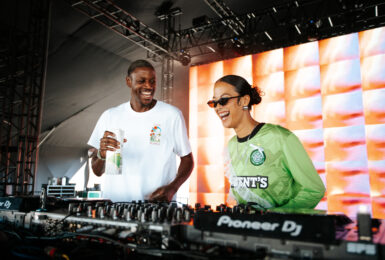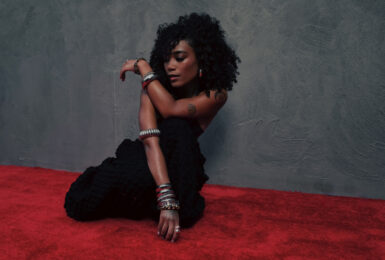Bobby Sessions
RVLTN (Chapter 1): The Divided States of AmeriKKKa
Hip-Hop
Def Jam
2018
Music
interview: lighting the spark of revolution, rapper bobby sessions tries to change the world with a record
As long as there’s been an underground and a mainstream, the trajectory for most underground artists has been to tone it down once they finally reach the big stage. But Dallas rapper Bobby Sessions isn’t most artists. On his Def Jam debut, he doubles down with a powerful, dense, political record. The unwieldily titled RVLTN (Chapter 1): The Divided States of AmeriKKKa is an uncompromising heavy record that looks back to the golden era of political hip-hop with a new fire. We recently spoke to Sessions about the revolution and RVLTN and how political music keeps the fire burning.
This a pretty big departure for you from your previous records. Was there an event or a moment when you realized this new record needs to be a lot harder and a lot more incisive than you’ve been before?
There wasn’t an individual or specific moment that I can pinpoint, that’s just the nature of the records we were crafting at the time. I’ve had similar content in the past, but sonically the music needed to match the content. And I wanted to make sure we did it this time around now that I have this new platform.
I feel like it’s pretty unheard that an artist gets signed to a larger label like Def Jam and then changes their sound to be less pop and more aggressive. Did the label back you or did you have to sell them on the idea?
We went into the new year with a plan, and we explained our plan and they were with it completely. I’m real big on clarity. I think artists could have more freedom to do this if they had a clear, concise vision for what path they wanted to take. We explained very clearly what we wanted to do. We felt that it fits into what Def Jam has always been. They put out acts like Public Enemy. They were on a similar path that I’m on, and we just felt like it made a lot of sense.
What did you say to them to convince them that “I know you signed me with Grateful but I want to do something harder?”
We said “this is the vision.” The art needs to reflect the times. I’m not in the business of complaining about other artists not speaking on certain things when I have the opportunity to do so and I think this makes a lot of sense with what Def Jam has always been, and they said “cool let’s go.”
You had put out “Black Neighborhood” before on LOA. What was behind the decision to bring that back?
We felt like the record is a timeless record. And now that we have a bigger audience and a new platform this was the time to re-release that record and introduce that song to a lot of new listeners.
How did the relationship with Killer Mike come about?
My manager J Dot Jones had a personal connection with Killer Mike and his team. We knew that he wanted to make this move for quite some time. But we wanted to make sure that the timing was right, and everything was good with the universe. A few months ago that timing lined up and it was amazing experience to see him come in to the studio do an interview upstairs, finish the interview write his verse in his head on the spot, and then perform at American airlines center right after that. Very honored that he would bless my record.
When a lot of people record political music, it tends to be a little generic, or at least non-specific. I think it’s really popular right now for an artist to record political-sounding music, but it’s not really about stuff. Maybe they throw in a “fuck Trump” or say “we” instead of “I” or something, but you listen to the track and it’s not really about issues the way that some of yours are. Do you go in with an idea in mind for what issues you want to tackle in a song?
Well, for all the music that is under my RVLTN series I take a look at society and I’m reporting the news. Hip-hop is not about tiptoeing or what you categorize as being generic. A lot of people are tiptoeing around issues, and when they speak out about something they kind of want to throw a stone and hide their hands. That’s not the era of hip-hop that I grew up listening to and I wanted to continue that tradition. I see a lot of things happening in society that are disturbing, and I’m reporting them and I’m being raw and uncut with how I deliver that news. And RVLTN is a space for me to get all those thoughts off and people understand the context of why they’re being said.
You talk about the era of hip-hop you grew up listening to. Who would you cite as your main influences?
My main influences overall are Jay Z, Eminem, Tupac, Kanye West, and Pharell. As far as speaking out about what’s happening—my social commentary side—I would say Tupac. He was very unapologetic with his opinions, he observed society and what he saw and he spoke about it freely. His message wasn’t watered down or censored for his own personal gain or an attempt to get some type of commercial success, and I want to treat art the same way.
Photo by Jeremy Biggers
When you talk about revolution what do you mean? What in your mind does that revolution look like?
It starts with taking the chains off your mind; the shackles between the ears. I think a lot of us are walking around like we’re free, but we’re still held back by our beliefs and our opinions about ourselves and what society can ultimately become. So the aggressive nature of this Chapter 1 is designed to get you shook; designed to get you disturbed or angry or happy—whatever emotion it needs to be—but an extreme one to get your mind moving and you decide for yourself how serious are you about making a change internally. How serious are you about improving your community, about speaking out about the wrong things about your community, and highlighting the good things in your community, and what are we gonna o to fix those things.
For me I’m using my platform I’m going out in the community, and talking to the kids; letting them know that despite all of these things you can still be successful. But we have to be honest and not think that if we ignore all of these problems that they’re gonna magically go away. They’re not gonna go away. In fact, they’re gonna keep spreading. So I’m stopping the bleeding before it continues to spread and I want to inspire everybody to get up and do something about it. There’s only so much I can do as an individual. But if all of us individually make the effort to make the world a better place then collectively we can get the job done.
On the record you ask “what are you wiling to do?” What do you see as the steps that need to be taken in order to move forward to a more just society?
I think the first step is honesty—and unfiltered truth. We need to be honest that a lot of us live in bubbles. Most of us only know about hat’s going on next to us. So we have to be honest that people live a different reality outside of my bubble—outside of the bubble that I’m currently living in. And the next step is to have honest unfiltered conversations between people from different bubbles so we can really educate ourselves about what’s going on in all of these different realities. And step 3 is take action. Whether that’s us educating ourselves on our history on the good and bad of our history to see what good things from our history we can build on in the future, and what negative things we need to erase. And step 4 would be persistence; to make sure all of us have the right habits of how we treat people and how we exist with one another. And then I think the job will complete itself at that point.
You describe the record as Chapter 1 in a series, where do you see the next chapters heading?
I can’t reveal that part! But Chapter 1: The Divided States of AmeriKKKa is about identifying what the problem is and then once we get into Chapter 2 and Chapter 3 you’ll see more story lines evolve. The tones will change. Every chapter won’t be the same. This Chapter 1 is me letting out that rage that a lot of us have suppressed for almost 500 years, and identifying exactly what the problem is. People have to stay tuned to the series once you get into Chapter 2 and Chapter 3 to see what messages you have to pull from and the story down the line.
As an artist that makes work that’s explicitly political, what do you think is your obligation to the activist world?
I feel like it’s not every artist’s responsibility because there’s different ways we all can contribute to the revolution, so to speak. As an artist, if you are capable of speaking out on these issues, you have a responsibility to do so. Thinking about the last 40 to 50 years, the revolution has always had a soundtrack. There’s always been a soundtrack to it. Music has been a great way to introduce people to politics and to being aware of what’s going on in society. Everybody doesn’t watch the news. People don’t want to go to seminars and conferences, so music is that first step.
If I can get you bobbing your head and get you thinking about things that you never think about—or didn’t even hear about—then that could spark you to start researching more about what’s going on in your community. It could spark you to start educating yourself about the history of this country and why things are fucked up. We know things are fucked up, but a lot of times we don’t know why. And music is just that nudge to get you interested in the idea of being aware of what’s going on; being socially conscious. I think that’s the relationship that music has with activism.
There’s a lot of things in my life where I wasn’t interested in learning about them until I heard it in a song. That’s why so many kids say “we were raised by Jay Z” because Jay Z taught us this lesson or that lesson even though we’re going for the entertainment of the song. I think I have the ability to make political songs or socially aware songs entertaining. So to not make that music is disrespectful to my community and disrespectful to my gift.
You talk about how the revolution has always had a soundtrack, which I absolutely fundamentally agree with. What would you say are your top 5 songs of that soundtrack? Like if you’re making a mixtape for the revolution what would you put on it?
That’s a great question. I would go “Fight the Power,” Public Enemy. “Alright” by Kendrick. “Say It Loud – I’m Black and I’m Proud” from James Brown. “Fuck Tha Police” NWA. And my “Politics” record off Chapter 1.
That’s a bold move to put yourself on that list!
Haha yeah. I had to throw that in there.
Is there anything else you want people to know about what you got going on or what’s coming up?
Just to stream my latest EP, RVLTN: Chapter 1, and be on the look out for following chapters down the line.
Get The Latest
Signup for the AFROPUNK newsletter




